小学英语基础知识汇总
小学必会英语知识点总结
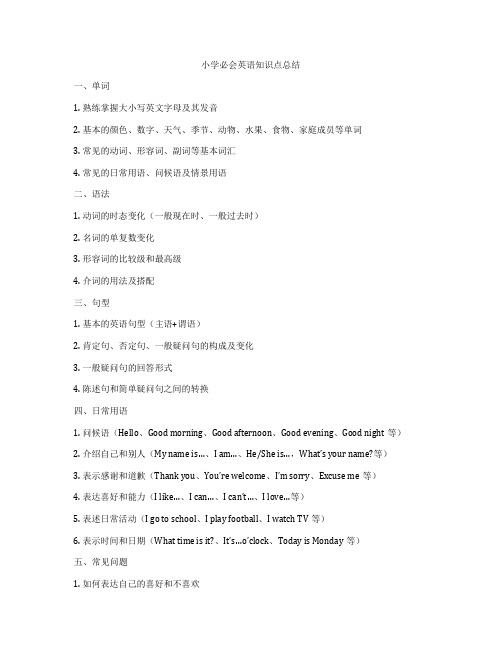
小学必会英语知识点总结一、单词1. 熟练掌握大小写英文字母及其发音2. 基本的颜色、数字、天气、季节、动物、水果、食物、家庭成员等单词3. 常见的动词、形容词、副词等基本词汇4. 常见的日常用语、问候语及情景用语二、语法1. 动词的时态变化(一般现在时、一般过去时)2. 名词的单复数变化3. 形容词的比较级和最高级4. 介词的用法及搭配三、句型1. 基本的英语句型(主语+谓语)2. 肯定句、否定句、一般疑问句的构成及变化3. 一般疑问句的回答形式4. 陈述句和简单疑问句之间的转换四、日常用语1. 问候语(Hello、Good morning、Good afternoon、Good evening、Good night等)2. 介绍自己和别人(My name is…、I am…、He/She is…,What’s your name?等)3. 表示感谢和道歉(Thank you、You’re welcome、I’m sorry、Excuse me等)4. 表达喜好和能力(I like…、I can…、I can’t…、I love…等)5. 表述日常活动(I go to school、I play football、I watch TV等)6. 表示时间和日期(What time is it?、It’s…o’clock、Today is Monday等)五、常见问题1. 如何表达自己的喜好和不喜欢2. 如何表达自己的能力和兴趣3. 如何介绍自己和别人4. 如何表达感谢和道歉5. 如何问候和打招呼6. 如何询问时间和日期六、常见情景1. 在学校的日常交际2. 家庭生活的交际3. 社交场合的交际4. 在商店购物的交际5. 在外出旅游时的交际七、其他1. 听力训练:多听英语,尝试模仿外国人的发音,锻炼自己的听力2. 朗读训练:多读英语文章,提高自己的朗读能力3. 写作训练:多写英语作文,练习自己的写作能力4. 视频学习:多观看英语教学视频,加强自己的口语表达能力以上为小学英语必知识点总结,希望能对小学生的英语学习有所帮助。
(超详)小学英语知识点归纳汇总

(超详)小学英语知识点归纳汇总
1. 语法知识点
- 主谓一致:主语和谓语动词在人称和数上保持一致。
- 形容词和副词的比较级和最高级:用于比较两个或多个事物的形容词和副词的变化形式。
- 名词的单复数:名词变化形式表示单数或复数。
- 时态:表示动作发生的时间,包括现在时、过去时和将来时等。
2. 词汇知识点
- 常用的基础词汇:包括数字、颜色、家庭成员、动物、食物等基本词汇。
- 动词:常用的动词及其过去式和现在分词形式。
- 名词:常见的名词及其单数和复数形式。
- 形容词和副词:用于描述事物的形容词和表示方式的副词。
3. 句型知识点
- 祈使句:用于表达命令、请求或建议的句子。
- 选择疑问句:用于提问时给出的选择项。
- 陈述句:陈述一个事实或描述一个情况的句子。
- 疑问句:用于提出问题的句子。
4. 阅读知识点
- 词义猜测:通过上下文推测词语的意思。
- 主旨理解:理解文章的中心思想或要点。
- 细节理解:理解文章中的具体细节信息。
- 推理判断:根据已有信息推断出未提及的信息。
以上是小学英语的一些基本知识点归纳汇总,希望对您有帮助!。
小学英语基础知识点归纳

小学英语基础知识点归纳小学开始接触英语,各位家长们都希望孩子能够学好,为未来打基础。
小学也有许多该掌握的基础知识,并不仅仅是字母音标的学习。
英语基础知识、语法知识、句法三部分内容大家都掌握了吗?下面的内容希望能让孩子学习更上一层楼!第一部分:基础知识1.字母:26个字母的大小写ABCDEFGHIJKLMNOPQRSTUVWXYZabcdefghijklmnopqrstuvwxyz2.语音:元音的发音五个元音字母:AEIOU12个单元音:前元音:[i:] [ɪ] /e/ [æ]中元音:[ɜ:] [ə]后元音:[ɑ:] [ɒ] [ɔ:] [u :] [ʊ] [ʌ]双元音(8个)Ⅰ.合口双元音(5个)[ai] [ei] [au] [əu] [ɔi]Ⅱ.集中双元音(3个) [iə][εə][uə]3.词汇:词汇量,近反义词4.句子:大小写,标点符号第二部分:语法知识①一.名词:名词单复数,名词的格(一)名词单复数1.一般情况,直接加-s,如:book-books, bag-bags, cat-cats, bed-beds2.以s. x. sh. ch结尾,加-es,如:bus-buses, box-boxes, brush-brushes, watch-watches3.以“辅音字母+y”结尾,变y为i, 再加-es,如:family-families, strawberry-strawberries4.以“f或fe”结尾,变f或fe为v, 再加-es,如:knife-knives5.不规则名词复数:man-men, woman-women, policeman-policemen, policewoman-policewomen, mouse-micechild-children, foot-feet, tooth-teeth, fish-fish, people-people, Chinese-Chinese, Japanese-Japanese不可数名词的复数就是原型:paper, juice, water, milk, rice, tea(二)名词的格(1) 有生命的东西的名词所有格:a) 单数后加’s 如: Lucy’s ruler my father’s shirtb) 以s 结尾的复数名词后加’如: his friends’bagsc) 不以s 结尾的复数后加’s children’s shoesl并列名词中,如果把’s加在最后一个名词后,表示共有, 如:Tom and Mike’s car 汤姆和迈克共有的小汽车l要表示所有物不是共有的,应分别在并列名词后加’sTom’s and Mike’s cars 汤姆和麦克各自的小汽车(2)表示无生命东西的名词通常用“of +名词”来表示所有关系:如:a picture of the classroom a map of China第二部分:语法知识②二.冠词:不定冠词,定冠词种类:(1)不定冠词:a / an a unit / an uncle元音开头的可数名词前用an :an egg / an apple / an orange / an eraser / an answer / an ID card / an alarm clock / an actor / an actress / an e-mail / an address / an event / an example / an opera / an houran old man / an interesting book / an exciting sport / an action movie / an art lesson /(2)定冠词:the the egg the plane2. 用法:定冠词的用法:(1)特指某(些)人或某(些)物:The ruler is on the desk.(2)复述上文提到的人或物:He has a sweater. The sweater is new.(3)谈话双方都知道的人或物:The boys aren’t at school.(4)在序数词前:John’s birthday is February the second.(5)用于固定词组中:in the morning / afternoon / evening不用冠词的情况:(1)专有名词前:China is a big country.(2)名词前有定语:this , that , my , your , some, any , no 等:This is my baseball.(3)复数名词表示一类人和事:Monkeys can’t swim. They are teachers.(4)在节日,日期,月份,季节前:Today is Christmas Day. It’s Sunday.(5)一日三餐前:We have breakfast at 6:30.(6)球类棋类运动前:They often play football after class. He plays chess at home. * 但乐器前要用定冠词:I play the guitar very well.(7)学科名称前:My favorite subject is music.(8)在称呼或头衔的名词前:This is Mr Li.(9)固定词组中:at noon at night by bus第二部分:语法知识③三、代词、形容词、副词代词:人称代词,物主代词人称代词物主代词主格宾格第一人称单数I(我)memy(我的)复数we(我们)usour(我们的)第二人称单数you(你)youyour(你的)复数you(你们)youyour(你们的)第三人称单数he(他)himhis(他的)she(她)herher(她的)it(它)itits(它的)复数they(他们/她们/它们)themtheir(他们的/她们的/它们的)形容词,副词:比较级,最高级(一)、形容词的比较级1、形容词比较级在句子中的运用:两个事物或人的比较用比较级,比较级后面一般带有单词than。
小学英语基础知识大全
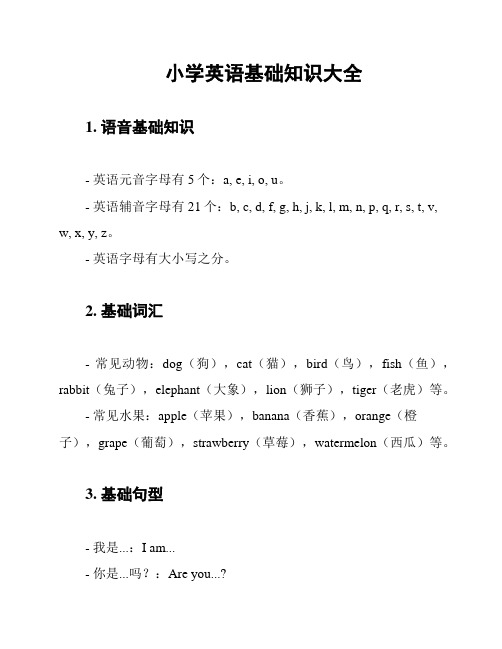
小学英语基础知识大全1. 语音基础知识- 英语元音字母有5个:a, e, i, o, u。
- 英语辅音字母有21个:b, c, d, f, g, h, j, k, l, m, n, p, q, r, s, t, v, w, x, y, z。
- 英语字母有大小写之分。
2. 基础词汇- 常见动物:dog(狗),cat(猫),bird(鸟),fish(鱼),rabbit(兔子),elephant(大象),lion(狮子),tiger(老虎)等。
- 常见水果:apple(苹果),banana(香蕉),orange(橙子),grape(葡萄),strawberry(草莓),watermelon(西瓜)等。
3. 基础句型- 我是...:I am...- 你是...吗?:Are you...?- 他/她是...:He/She is...- 这是...:This is...- 这是什么?:What is this?- 我喜欢...:I like...- 请给我...:Please give me...4. 常见问候语- 早上好:Good morning.- 下午好:Good afternoon.- 晚上好:Good evening.- 再见:Goodbye.- 谢谢:Thank you.- 对不起:Sorry.5. 常见数字- 数字0-10:zero(零),one(一),two(二),three (三),four(四),five(五),six(六),seven(七),eight (八),nine(九),ten(十)。
6. 基础时间表达- 星期:Monday(星期一),Tuesday(星期二),Wednesday (星期三),Thursday(星期四),Friday(星期五),Saturday(星期六),Sunday(星期日)。
- 时间:morning(早上),afternoon(下午),evening(晚上)。
小学英语必背基础知识

小学英语必背基础知识
《小学英语必背基础知识》
小学英语是学生接触外语的第一门门槛,基础知识的掌握对学生的英语学习起着至关重要的作用。
下面是小学英语必背的基础知识:
1. 26个字母:学生要熟练掌握26个英文字母的大小写形式,以及它们的发音和字母顺序。
2. 常见的颜色:红色、绿色、蓝色、黄色、黑色、白色等,学生要能够准确地认识并描述这些颜色。
3. 基本数字:学生需要掌握基础的数字0-100的读法和写法,以及简单的四则运算。
4. 基本的问候语:学生要学会用英语问候他人,比如“Hello!”,“How are you?”等常用的问候语。
5. 常见的动物和植物:学生应该能够认出一些常见的动物和植物的英文名称,比如dog、cat、flower等。
6. 基础的日常用语:学生要具备一些基本的日常用语,比如“Can I go to the bathroom?”、“May I have some water?”等。
以上是小学英语必背的基础知识,这些知识对学生的英语学习起着重要的基础作用,帮助学生打下坚实的英语学习基础。
小学英语基础知识点总结归纳人教版
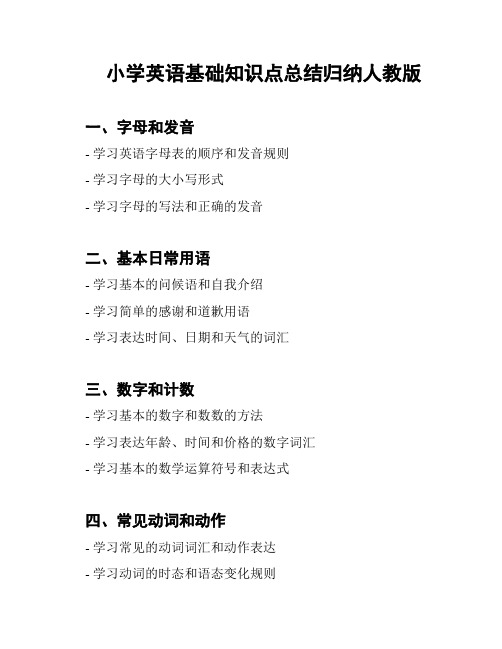
小学英语基础知识点总结归纳人教版
一、字母和发音
- 学习英语字母表的顺序和发音规则
- 学习字母的大小写形式
- 学习字母的写法和正确的发音
二、基本日常用语
- 学习基本的问候语和自我介绍
- 学习简单的感谢和道歉用语
- 学习表达时间、日期和天气的词汇
三、数字和计数
- 学习基本的数字和数数的方法
- 学习表达年龄、时间和价格的数字词汇
- 学习基本的数学运算符号和表达式
四、常见动词和动作
- 学习常见的动词词汇和动作表达
- 学习动词的时态和语态变化规则
- 学习基本的句子结构和动词短语的用法
五、常见名词和物品
- 学习常见的名词和物品词汇
- 学习名词的单复数形式和所有格的用法- 学习描述物品和人物特征的形容词
六、日常生活和交流
- 学习描述日常活动和习惯的词汇
- 学习询问和表达喜好和兴趣的用语
- 学习简单的购物和餐厅用语
七、常见句型和语法
- 学习基本的肯定句、否定句和疑问句结构- 学习基本的时态和语态的用法
- 学习简单的从句和复合句结构
八、常见短语和口语表达
- 学习常见的短语和口语表达
- 学习常用的日常交流和情景对话
- 学习表达个人意见和观点的句型
以上是小学英语基础知识点的总结归纳,主要基于人教版教材内容。
通过学习这些知识点,可以建立起对英语的基本理解和应用能力,为进一步学习打下坚实的基础。
小学三至六年级英语知识点归纳总结
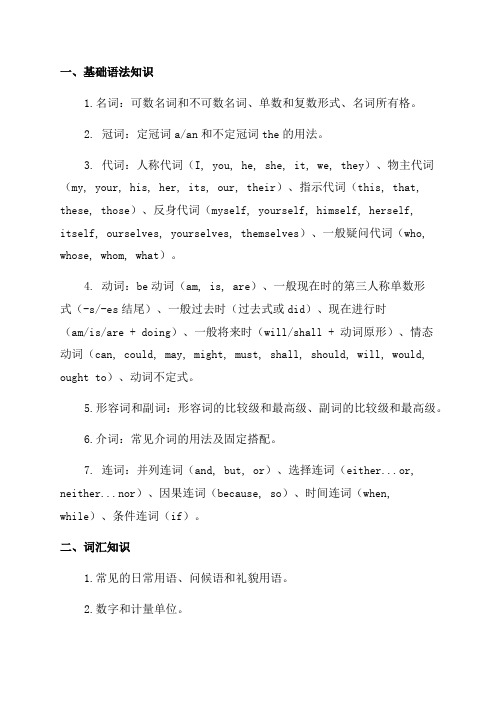
一、基础语法知识1.名词:可数名词和不可数名词、单数和复数形式、名词所有格。
2. 冠词:定冠词a/an和不定冠词the的用法。
3. 代词:人称代词(I, you, he, she, it, we, they)、物主代词(my, your, his, her, its, our, their)、指示代词(this, that, these, those)、反身代词(myself, yourself, himself, herself, itself, ourselves, yourselves, themselves)、一般疑问代词(who, whose, whom, what)。
4. 动词:be动词(am, is, are)、一般现在时的第三人称单数形式(-s/-es结尾)、一般过去时(过去式或did)、现在进行时(am/is/are + doing)、一般将来时(will/shall + 动词原形)、情态动词(can, could, may, might, must, shall, should, will, would, ought to)、动词不定式。
5.形容词和副词:形容词的比较级和最高级、副词的比较级和最高级。
6.介词:常见介词的用法及固定搭配。
7. 连词:并列连词(and, but, or)、选择连词(either...or, neither...nor)、因果连词(because, so)、时间连词(when, while)、条件连词(if)。
二、词汇知识1.常见的日常用语、问候语和礼貌用语。
2.数字和计量单位。
3.季节、天气、时间和日期的词汇。
4.日常生活中的家庭、学校、城市、交通工具等的词汇。
5.常见的动物、植物、水果、蔬菜等的词汇。
6.颜色、形状、大小、方向等的词汇。
7.常见的体育项目、运动用品和运动动作的词汇。
三、阅读和写作技巧1.阅读理解:根据文章内容回答问题、判断正误、选择正确答案等。
小学英语必背100个基础知识(完整版)

一、一个星期七天Sunday Monday Tuesday Wednesday Thursday Friday Saturday二、一年十二个月January February March April May JuneJulyAugust September October November December三、一年四季1. spring2. summer3. autumn4. winter四、容易拼写错的数字1. eighth第八2. ninth第九3. forty四十4. twelfth第十二5. twentieth第二十五、亲属称呼1. daughter (女儿)2. niece (女性晚辈)3. nephew (男性晚辈)4. cousin (同辈兄弟姐妹)5. aunt (女性长辈)6. uncle (男性长辈)六、以下动词加-ed或-ing要双写最后一个字母1. regret (regretted, regretting) 后悔2. control (controlled, controlling) 控制3. admit (admitted, admitting) 承认4. occur (occurred, occurring) 出现5. prefer (preferred, preferring) 宁愿6. refer (referred, referring) 提到7. forget (forgetting ) 忘记8. permit (permitted, permitting)允许9. equip (equipped, equipping) 装备注意:quarrel, signal, travel中的l可双写(英国英语)也可不双写(美国英语)七、部分过去式和过去分词不规则变化的动词1. broadcast (broadcast, broadcast) 广播2. flee (fled, fled) 逃跑3. forbid (forbade, forbidden) 禁止4. forgive (forgave, forgiven) 原谅5. freeze (froze,frozen) 结冰 6. hang (作“绞死”讲,是规则的;作“悬挂”讲,其过去式过去分词都是hung)7. lie –lied –lied 说谎; lie—lay---lain躺下lay-laid- laid 放置 8. seek (sought, sought) 寻求9. shake (shook, shaken) 发抖 10. sing (sang, sung) 唱歌11. sink (sank, sunk/sunken) 下沉 12. spread (spread, spread) 传播13. swim (swam, swum) 游泳 14. tear (tore, torn) 撕碎16. wear( wore; worn) 穿/戴 17. hold (held, held ) 18. make (made, made) 19. keep (kept, kept)八、意思相近的词1. check (核对)/ examine(检查)/ test(测试)2. receive(收到)/ accept(接受)3. destroy (毁坏;毁灭)/ damage(破坏)4. celebrate(庆祝)/ congratulate (祝贺)5. wear sth / dress sb 穿衣九、注意形容词变名词时的拼写变化1. long—length 长度2. wide—width 宽度3. high—height 高度4. strong—strength力量以-ic结尾的动词,应先把-ic变为-ick,再加ing或edpicnic (picnicked, picnicking) 野餐十、个别名词的复数拼写1. German (Germans) 德国人2. gulf (gulfs) 海湾3. handkerchief (handkerchiefs) 手帕roof (roofs) 房顶4. hero (英雄),potato (土豆),tomato (西红柿) 等有生命的以-o结尾的名词变复数时要加-es。
小学英语基础知识汇总,必备

小学英语基础知识汇总,必备小学英语形容词性物主代词1、形容词性物主代词8 个:My your his her its our your their我的你的他的她的它的我们的你们的他( 她、它 ) 们的2、形容词性物主代词的特点:1)译成汉语都有 " 的" eg:my 我的 their 他们的2) 后面加名词: eg:my backpack his name3)前后不用冠词 a an theThis is a my eraser( 错误 )That is your a pen( 错误 )It's his the pen( 错误 )3、I( 物主代词 )my you( 物主代词 )your he ( 物主代词 )her we ( 物主代词 ) our注:在变物主代词时,把原题所给的词加上的,再译成单词就可以了。
2小学英语名词性物主代词1、名词性物主代词和形容词性物主代词一样有8 个:Mine yours his hers its ours yours theirs我的你的他的她的它的我们的你们的他( 她、它) 们的2、名词性物主代词的特点:1)译成汉语都有 " 的"2)后面不加名词3)名词性物主代词 =形容词性物主代词 +名词:eg: the pen is mine 钢笔是我的 (mine=my pen)3小学英语单数的句子变成复数的句子把单数的句子成复数的句子很简单:变法是把能变成复数的词变成复数,但 a 或 an 要把去掉。
特殊疑问词、形容词、国家及地点通常不变。
把下列句子变成复数 :1, I have a car ----we have cars2, He is an American boy. ----They are American boys3, It is a car ----They are cars4,This is an eraser ----These are erasers5,That is a backpsck -----Those are backpacks6,I'm an English teather ------We are English teathers7,It's a new shirt---- They are new shirts8,He's a boy ----They are boys9,She's a singer ------They are singers10,What'sthis in English?---- What are these in English?4小学英语名词的数语法名词有单数和复数两种形式:1、名词的单数:表示一个人或一个事物2、名词的复数:表示一个人以上的人或事物名词复数的变化规律如下:1、多数情况下在名词后面加S,s 在清辅音后读【 S】2、以s,x,sh,ch 为结尾的词在词尾加es, es 读作【 iz 】3、以 f ,f为结尾的词去掉 f 或fe 加 ves ,ves 读作【 vz】e4、以辅音加 y 结尾的词,变y 为 ies5、以元音加 y 结尾的词,直接加s6、不规则变化Man-menwoman-women policeman-policemenPolicewoman-policewomen 这种情况下 a 变成 e1、单复数同形Chinese-chinese Japanese-japanese sheep -sheep deer-deer2、This 这个these 这些 ( 复数 ) that 那个those 那些 ( 复数 ) I我we我们 ( 复数 ) he 他she 她i它they 他、它、她们t( 复数 ) am ,is 是are( 复数 )5小学英语人称代词主格及宾格人称代词分为主格和宾格,主格和宾格区别:主格和宾格汉语意思相同,但位置不同。
小学生必须掌握的英语基础知识

小学生必须掌握的英语基础知识第一部分:基础知识1.字母:26个字母的大小写ABCDEFGHIJKLMNOPQRSTUVWXYZabcdefghijklmnopqrstuvwxyz2.语音:元音的发音五个元音字母:AEIOU12个单元音:前元音:[i:] [ɪ] /e/ [æ]中元音:[ɜ:] [ə]后元音:[ɑ:] [ɒ] [ɔ:] [u :] [ʊ] [ʌ]双元音(8个)Ⅰ.合口双元音(5个)[ai] [ei] [au] [əu] [ɔi]Ⅱ.集中双元音(3个) [iə][εə][uə]3.词汇:词汇量,近反义词4.句子:大小写,标点符号第二部分:语法知识一.名词:名词单复数,名词的格(一)名词单复数1.一般情况,直接加-s,如:book-books, bag-bags, cat-cats, bed-beds2.以s. x. sh. ch结尾,加-es,如:bus-buses, box-boxes, brush-brushes, watch-watches3.以“辅音字母+y”结尾,变y为i, 再加-es,如:family-families, strawberry-strawberries4.以“f或fe”结尾,变f或fe为v, 再加-es,如:knife-knives5.不规则名词复数:man-men, woman-women, policeman-policemen, policewoman-policewomen, mouse-micechild-children, foot-feet, tooth-teeth, fish-fish, people-people, Chinese-Chinese, Japanese-Japanese不可数名词的复数就是原型:paper, juice, water, milk, rice, tea(二)名词的格(1) 有生命的东西的名词所有格:a) 单数后加’s 如: Lucy’s ruler my father’s shirtb) 以s 结尾的复数名词后加’如: his friends’ bagsc) 不以s 结尾的复数后加’s children’s shoesl并列名词中,如果把’s加在最后一个名词后,表示共有, 如:Tom and Mike’s car 汤姆和迈克共有的小汽车l要表示所有物不是共有的,应分别在并列名词后加’sTom’s and Mike’s cars 汤姆和麦克各自的小汽车(2)表示无生命东西的名词通常用“ of +名词”来表示所有关系:如:a picture of the classroom a map of China二.冠词:不定冠词,定冠词种类:(1)不定冠词:a / an a unit / an uncle元音开头的可数名词前用an :an egg / an apple / an orange / an eraser / an answer / an ID card / an alarm clock / an actor / an actress / an e-mail / an address / an event / an example / an opera / an houran old man / an interesting book / an exciting sport / an action movie / an art lesson /(2)定冠词:the the egg the plane2. 用法:定冠词的用法:(1)特指某(些)人或某(些)物:The ruler is on the desk.(2)复述上文提到的人或物:He has a sweater. The sweater is new.(3)谈话双方都知道的人或物:The boys aren’t at school.(4)在序数词前:John’s birthday is February the second.(5)用于固定词组中:in the morning / afternoon / evening不用冠词的情况:(1)专有名词前:China is a big country.(2)名词前有定语:this , that , my , your , some, any , no 等:This is my baseball.(3)复数名词表示一类人和事:Monkeys can’t swim. They are teachers.(4)在节日,日期,月份,季节前:Today is Christmas Day. It’s Sunday.(5)一日三餐前:We have breakfast at 6:30.(6)球类棋类运动前:They often play football after class. He plays chess at home.* 但乐器前要用定冠词:I play the guitar very well.(7)学科名称前:My favorite subject is music.(8)在称呼或头衔的名词前:This is Mr Li.(9)固定词组中:at noon at night by bus三、代词、形容词、副词代词:人称代词,物主代词人称代词物主代词主格宾格第一人称单数I(我)me my(我的)复数we(我们)us our(我们的)第二人称单数you(你)you your(你的)复数you(你们)you your(你们的)第三人称单数he(他)him his(他的)she(她)her her(她的)it(它)it its(它的)复数they(他们/她们/它们)them their(他们的/她们的/它们的)形容词,副词:比较级,最高级(一)、形容词的比较级1、形容词比较级在句子中的运用:两个事物或人的比较用比较级,比较级后面一般带有单词than。
小学生必须掌握的英语基础知识

小学生必须掌握的英语基础知识第一部分:基础知识1.字母:26个字母的大小写ABCDEFGHIJKLMNOPQRSTUVWXYZabcdefghijklmnopqrstuvwxyz2.语音:元音的发音五个元音字母:AEIOU12个单元音:前元音:[i:] [ɪ] /e/ [æ]中元音:[ɜ:] [ə]后元音:[ɑ:] [ɒ] [ɔ:] [u :] [ʊ] [ʌ]双元音(8个)Ⅰ.合口双元音(5个)[ai] [ei] [au] [əu] [ɔi]Ⅱ.集中双元音(3个) [iə][εə][uə]3.词汇:词汇量,近反义词4.句子:大小写,标点符号第二部分:语法知识一.名词:名词单复数,名词的格(一)名词单复数1.一般情况,直接加-s,如:book-books, bag-bags, cat-cats, bed-beds2.以s. x. sh. ch结尾,加-es,如:bus-buses, box-boxes, brush-brushes, watch-watches3.以“辅音字母+y”结尾,变y为i, 再加-es,如:family-families, strawberry-strawberries4.以“f或fe”结尾,变f或fe为v, 再加-es,如:knife-knives5.不规则名词复数:man-men, woman-women, policeman-policemen, policewoman-policewomen, mouse-micechild-children, foot-feet, tooth-teeth, fish-fish, people-people, Chinese-Chinese, Japanese-Japanese不可数名词的复数就是原型:paper, juice, water, milk, rice, tea(二)名词的格(1) 有生命的东西的名词所有格:a) 单数后加’s 如: Lucy’s ruler my father’s shirtb) 以s 结尾的复数名词后加’如: his friends’ bagsc) 不以s 结尾的复数后加’s children’s shoesl并列名词中,如果把’s加在最后一个名词后,表示共有, 如:Tom and Mike’s car 汤姆和迈克共有的小汽车l要表示所有物不是共有的,应分别在并列名词后加’sTom’s and Mike’s cars 汤姆和麦克各自的小汽车(2)表示无生命东西的名词通常用“ of +名词”来表示所有关系:如:a picture of the classroom a map of China二.冠词:不定冠词,定冠词种类:(1)不定冠词:a / an a unit / an uncle元音开头的可数名词前用an :an egg / an apple / an orange / an eraser / an answer / an ID card / an alarm clock / an actor / an actress / an e-mail / an address / an event / an example / an opera / an houran old man / an interesting book / an exciting sport / an action movie / an art lesson /(2)定冠词:the the egg the plane2. 用法:定冠词的用法:(1)特指某(些)人或某(些)物:The ruler is on the desk.(2)复述上文提到的人或物:He has a sweater. The sweater is new.(3)谈话双方都知道的人或物:The boys aren’t at school.(4)在序数词前:John’s birthday is February the second.(5)用于固定词组中:in the morning / afternoon / evening不用冠词的情况:(1)专有名词前:China is a big country.(2)名词前有定语:this , that , my , your , some, any , no 等:This is my baseball.(3)复数名词表示一类人和事:Monkeys can’t swim. They are teachers.(4)在节日,日期,月份,季节前:Today is Christmas Day. It’s Sunday.(5)一日三餐前:We have breakfast at 6:30.(6)球类棋类运动前:They often play football after class. He plays chess at home.* 但乐器前要用定冠词:I play the guitar very well.(7)学科名称前:My favorite subject is music.(8)在称呼或头衔的名词前:This is Mr Li.(9)固定词组中:at noon at night by bus三、代词、形容词、副词代词:人称代词,物主代词人称代词物主代词主格宾格第一人称单数I(我)me my(我的)复数we(我们)us our(我们的)第二人称单数you(你)you your(你的)复数you(你们)you your(你们的)第三人称单数he(他)him his(他的)she(她)her her(她的)it(它)it its(它的)复数they(他们/她们/它们)them their(他们的/她们的/它们的)形容词,副词:比较级,最高级(一)、形容词的比较级1、形容词比较级在句子中的运用:两个事物或人的比较用比较级,比较级后面一般带有单词than。
小学英语全套重点知识汇总
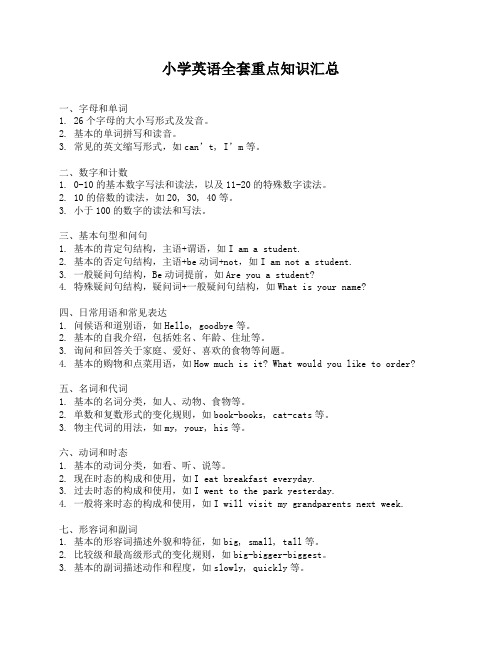
小学英语全套重点知识汇总一、字母和单词1. 26个字母的大小写形式及发音。
2. 基本的单词拼写和读音。
3. 常见的英文缩写形式,如can’t, I’m等。
二、数字和计数1. 0-10的基本数字写法和读法,以及11-20的特殊数字读法。
2. 10的倍数的读法,如20, 30, 40等。
3. 小于100的数字的读法和写法。
三、基本句型和问句1. 基本的肯定句结构,主语+谓语,如I am a student.2. 基本的否定句结构,主语+be动词+not,如I am not a student.3. 一般疑问句结构,Be动词提前,如Are you a student?4. 特殊疑问句结构,疑问词+一般疑问句结构,如What is your name?四、日常用语和常见表达1. 问候语和道别语,如Hello, goodbye等。
2. 基本的自我介绍,包括姓名、年龄、住址等。
3. 询问和回答关于家庭、爱好、喜欢的食物等问题。
4. 基本的购物和点菜用语,如How much is it? What would you like to order?五、名词和代词1. 基本的名词分类,如人、动物、食物等。
2. 单数和复数形式的变化规则,如book-books, cat-cats等。
3. 物主代词的用法,如my, your, his等。
六、动词和时态1. 基本的动词分类,如看、听、说等。
2. 现在时态的构成和使用,如I eat breakfast everyday.3. 过去时态的构成和使用,如I went to the park yesterday.4. 一般将来时态的构成和使用,如I will visit my grandparents next week.七、形容词和副词1. 基本的形容词描述外貌和特征,如big, small, tall等。
2. 比较级和最高级形式的变化规则,如big-bigger-biggest。
小学英语基础知识汇总

第一章?名词一、名词可分为:1.专有名词和普通名词 2.可数名词和不可数名词1.专有名词和普通名词1)专有名词:是指特定的人、地方、事物、机构的专有名称。
开头的字母必须大写。
如:Tom, Martin, Shenzhen, Hong Kong, China, Sunday, October, Chinese等。
2)普通名词:是指不属于特定的人名、地名、事物、概念的名词都是普通名词。
它分为四类:个体名词、集体名词、物质名词、抽象名词。
①???个体名词:用来表示单个的人或事物。
如:hospital, policeman, house, tree, cat, dog等。
②???集体名词:用来表示一群人或一些事物的总称。
如:family, class, group, people, police, army等。
③???物质名词:表示无法分为个体的物质。
如:water, air, tea, sugar, butter, rice等。
④???抽象名词:表示动作、状态、品质或其他抽象概念。
如:happiness, health, life, manners, love等。
2.可数名词和不可数名词1)可数名词:一般地说,个体名词和集体名词是可以计数的,所以称之为可数名词,有单数和复数形式。
如:a city---two cities??a bird---three birds??a book---ten books可数名词复数形式的构成:①规则变化:②不规则变化:英语里有一部分名词的复试形式是不规则的。
a)?改变元音字母,发音也随之发生变化。
如:man---men??woman---women??policewoman---policewomen??postman---postmen??policeman---policemen??foot---feet??tooth---teeth??goose---geese注意:man和woman用作定语时,也有单复数变化。
小学英语 最全的基础知识归纳
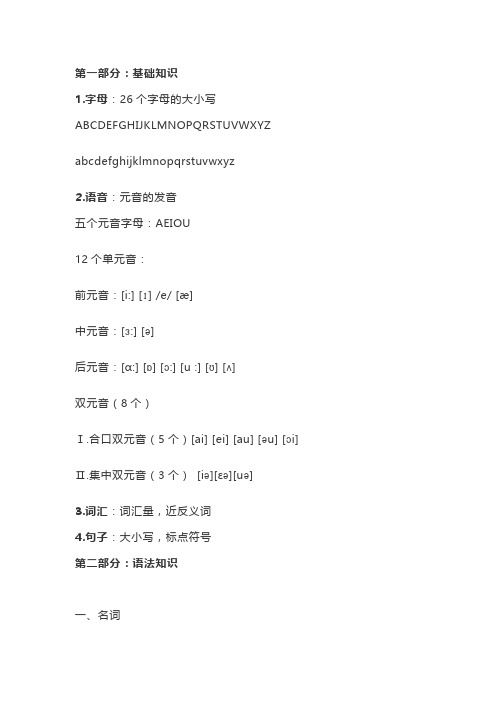
第一部分:基础知识1.字母:26个字母的大小写ABCDEFGHIJKLMNOPQRSTUVWXYZ abcdefghijklmnopqrstuvwxyz2.语音:元音的发音五个元音字母:AEIOU12个单元音:前元音:[i:] [ɪ] /e/ [æ]中元音:[ɜ:] [ə]后元音:[ɑ:] [ɒ] [ɔ:] [u :] [ʊ] [ʌ]双元音(8个)Ⅰ.合口双元音(5个)[ai] [ei] [au] [əu] [ɔi] Ⅱ.集中双元音(3个)[iə][εə][uə]3.词汇:词汇量,近反义词4.句子:大小写,标点符号第二部分:语法知识一、名词名词单复数,名词的格式(一)名词单复数1.一般情况,直接加-s,如:book-books, bag-bags, cat-cats, bed-beds2.以s. x. sh. ch结尾,加-es,如:bus-buses, box-boxes, brush-brushes, watch-watches3.以“辅音字母+y”结尾,变y为i, 再加-es,如:family-families, strawberry-strawberries4.以“f或fe”结尾,变f或fe为v, 再加-es,如:knife-knives5.不规则名词复数:man-men, woman-women, policeman-policemen, policewoman-policewomen, mouse-micechild-children, foot-feet, tooth-teeth, fish-fish, people-people, Chinese-Chinese, Japanese-Japanese不可数名词的复数就是原型:paper, juice, water, milk, rice, tea(二)名词的格(1) 有生命的东西的名词所有格:a) 单数后加’s 如: Lucy’s ruler my father’s shirtb) 以s 结尾的复数名词后加’如: his friends’bagsc) 不以s 结尾的复数后加’s children’s shoesl并列名词中,如果把’s加在最后一个名词后,表示共有, 如: Tom and Mike’s car 汤姆和迈克共有的小汽车l要表示所有物不是共有的,应分别在并列名词后加’sTom’s and Mike’s cars 汤姆和麦克各自的小汽车(2)表示无生命东西的名词通常用“of +名词”来表示所有关系:如:a picture of the classroom a map of China二、冠词不定冠词,定冠词种类:(1)不定冠词:a / an a unit / an uncle元音开头的可数名词前用an :an egg / an apple / an orange / an eraser / an answer / an ID card / an alarm clock / an actor / an actress / an e-mail / an address / an event / an example / an opera / an houran old man / an interesting book / an exciting sport / an action movie / an art lesson /(2)定冠词:thethe egg the plane2. 用法:定冠词的用法:(1)特指某(些)人或某(些)物:The ruler is on the desk.(2)复述上文提到的人或物:He has a sweater. The sweater is new.(3)谈话双方都知道的人或物:The boys aren’t at school.(4)在序数词前:John’s birthday is February the second.(5)用于固定词组中:in the morning / afternoon / evening不用冠词的情况:(1)专有名词前:China is a big country.(2)名词前有定语:this , that , my , your , some, any , no 等:This is my baseball.(3)复数名词表示一类人和事:Monkeys can’t swim. They are teachers.(4)在节日,日期,月份,季节前:Today is Christmas Day. It’s Sunday.(5)一日三餐前:We have breakfast at 6:30.(6)球类棋类运动前:They often play football after class. He plays chess at home.* 但乐器前要用定冠词:I play the guitar very well.(7)学科名称前:My favorite subject is music.(8)在称呼或头衔的名词前:This is Mr Li.(9)固定词组中:at noon at night by bus三、代词、形容词、副词代词:人称代词,物主代词人称代词物主代词主格宾格第一人称单数I(我)memy(我的)复数we(我们)usour(我们的)第二人称单数you(你)youyour(你的)复数you(你们)youyour(你们的)第三人称单数he(他)himhis(他的)she(她)herher(她的)it(它)itits(它的)复数they(他们/她们/它们)themtheir(他们的/她们的/它们的)形容词,副词:比较级,最高级(一)、形容词的比较级1、形容词比较级在句子中的运用:两个事物或人的比较用比较级,比较级后面一般带有单词than。
三至六年级英语必背知识点

一、基础语法1.一般现在时:表示经常性的、习惯性的或真理性的动作或状态。
2.一般过去时:表示过去一些时间发生的动作或存在的状态。
3. 表达过去习惯的方式:used to + 动词原形。
4.现在进行时:表示现在正在进行的动作,常与现在时间状语连用。
5. 情态动词can/could:表示能力、许可或请求。
6. 情态动词should/shouldn't:表示建议或劝告。
7.数词的表达方式:基数词和序数词的用法。
8.比较级和最高级的形式及用法:形容词和副词的比较级和最高级的构成和用法。
9. 定冠词和不定冠词的用法:the、a/an的用法。
10.名词单复数的形式及用法:不规则名词的复数形式。
二、日常用语1. 问候和道别的常用表达:例如Hello, Hi, Good morning, Goodbye, Bye等。
2. 自我介绍和介绍他人的常用表达:例如My name is…, I am…, This is…等。
3. 家庭和亲属的称呼:例如father, mother, sister, brother, grandparents等。
4. 日常生活中常用的动词和词组:例如eat, drink, sleep, get up, go to school, do homework等。
5. 表述喜欢和不喜欢的表达方式:例如I like…, I don't like…,I love…等。
6. 询问和表达年龄的句型:例如How old are you?, I am… years old等。
7. 询问和表达兴趣爱好的句型:例如What do you like to do?, I like…等。
9. 表述天气的常用句型:例如What's the weather like today?,It's sunny, rainy, cloudy等。
10. 询问和表达方向的句型:例如Excuse me, How can I get to…?, Go straight, Turn left/right等。
小学英语入门

小学英语入门引言英语作为一门全球通用的语言,对于小学生来说,学习英语已经成为必不可少的一部分。
通过学习英语,小学生可以扩大视野,提升自我能力,为未来的学习和工作做好准备。
本文将介绍小学英语入门的一些基础知识和学习方法,帮助小学生更好地学习和掌握英语。
学习目标•了解英语的基本单词和语法•掌握基本的英语对话和交流技巧•建立良好的英语学习习惯和自信心一、英语基础知识1. 英语字母表英语字母表是学习英语的基础,小学生应该掌握26个字母的发音和写法。
以下是英语字母表:A B C D E F G H I J K L MN O P Q R S T U V W X Y Z2. 基本单词和词汇学习英语的第一步是掌握一些基本的单词和词汇。
小学生可以从日常生活中选择一些常见的单词开始学习,例如:•人称代词:I, you, he, she, it•颜色:red, blue, yellow, green•动物:cat, dog, bird, fish•数字:one, two, three, four, five通过与图片配合学习,可以更好地理解和记忆这些单词。
3. 基本语法英语的基本语法对于小学生来说是比较简单的。
以下是一些基本的语法规则:•句子构成:主语 + 谓语 + 宾语•时态:现在时态、过去时态、将来时态•人称代词的使用:I用于自己,you用于你,he/she/it用于第三人称二、英语学习方法1. 听力练习通过听力练习,小学生可以提高对英语的听力理解能力。
可以选择一些适合小学生的英语儿童歌曲或者英语童话故事进行听力训练。
同时,可以利用一些英语学习APP,如Duolingo、Rosetta Stone等,进行听力练习。
2. 口语练习口语是英语学习中非常重要的一部分。
通过与同学、老师或家人进行英语对话练习,可以提升口语表达能力。
还可以参加一些英语角或英语俱乐部的活动,与其他学习英语的人交流和练习口语。
3. 阅读练习阅读是扩大词汇量和理解英语的重要途径。
(完整版)小学英语1-6年级要点知识点汇总(期末特别整理)

小学英语1-6年级要点知识点汇总(期末特别整理)第一部分:基础知识2. 以s. x. sh. ch 结尾,加-es ,如:bus-buses,1. 字母:26 个字母的大小写box-boxes, brush-brushes, watch -watchesABCDEFGHIJKLMNOPQRSTUVWXYZ 3.以“辅音字母+y” 结尾,变y 为i, 再加-es ,abcdefghijklmnopqrstuvwxyz 如:family-families, strawberry -strawberries2.语音:元音的发音 4.以“ f或fe ”结尾,变f或fe为v,再加-es , 五个元音字母:AEIOU 如: knife-knives12个单元音:前元音:[i:] [ ?] /e/ [?] 5.不规则名词复数:中元音:[?:] [ ?] man-men, woman-women, policeman -policemen,后元音:[a :] [ ?] [ ?:] [u :] [ ?] [ ?] policewoman -policewomen, mouse -mice双元音(8个)child -children, foot-feet, tooth-teeth,I .合口双元音(5个)fish-fish, people-people, Chinese -Chinese, [ai] [ei] [au] [ ?u] [ ?i] Japanese -Japanesen.集中双元音(3个)[i ?][ £ ?][u ?] 不可数名词的复数就是原型:paper, juice,3.词汇:词汇量,近反义词water, milk, rice, tea4.句子:大小写,标点符号(二)名词的格第二部分:语法知识(1)有生命的东西的名词所有格:一.名词:名词单复数,名词的格a)单数后加's如:Lucy ' s ruler my(一)名词单复数father ' s shirt1. 一般情况,直接加-s ,如:book-books, b)以s结尾的复数名词后加'如:hisbag-bags, cat-cats, bed-beds friends ' bagsc) 不以s结尾的复数后加's children ' s shoesI并列名词中,如果把’s加在最后一个名词后,表示共有,如:Tom and Mike' s car 汤姆和迈克共有的小汽车I要表示所有物不是共有的,应分别在并列名词后加’sTom s and Mike ' s ca rs 汤姆和麦克各白的小汽车(2) 表示无生命东西的名词通常用“ of +名词来表示所有关系:如:a picture of the classroom a map of China 第二部分:语法知识二. 冠词:不定冠词,定冠词种类:(1) 不定冠词:a / an a unit / an uncle 元音开头的可数名词前用an :an egg / an apple / an orange / an eraserI an answer / an ID card / an alarm clock / an actor / an actress / an e -mail / an address /an event / an example / an opera / an houran old man / an interesting book / an exciting sport / an action movie / an a rt lesson /(2) 定冠词:the the egg the plane2. 用法:定冠词的用法:(1) 特指某(些)人或某(些)物:The ruler is on the desk.(2) 复述上文提到的人或物:He has a sweater.The sweater is new.(3) 谈话双方都知道的人或物:The boys aren ' t at school.(4) 在序数词前:John" s birthday is February the second.(5) 用于固定词组中:in the morning / afternoon / evening不用冠词的情况:(1) 专有名词前:China is a big country.(2) 名词前有定语:this , that, my , your, some, any , no 等:This is my baseball.(3) 复数名词表示一类人和事:Monkeys can" t swim. They are teachers.(4) 在节日,日期,月份,季节前:Today is Christmas Day. It ' s Sunday.(5) 一日三餐前:We have breakfast at 6:30.(6)球类棋类运动前:They often play football after class. He plays chess at home.*但乐器前要用定冠词:I play the guitar very well.(7)学科名称前:My favorite subject is music.(8)在称呼或头衔的名词前:This is Mr Li.(9)固定词组中:at noon at night by bus第二部分:语法知识三、代词、形容词、副词代词:人称代词,物主代词人称代词物主代词主格宾格第一人称单数1(我)memy(我的)复数we(我们)usour(我们的)第二人称单数you(你)youyour(你的)复数you(你们)youyour(你们的)第三人称单数he (他)himhis(他的) she(她)herher(她的)it(它)itits(它的)复数they(他们/她们/它们)themtheir(他们的/她们的/它们的)形容词,副词:比较级,最高级(一)、形容词的比较级1. 形容词比较级在句子中的运用:两个事物或人的比较用比较级,比较级后面一般带有单词than。
小学英语入门基础知识归纳
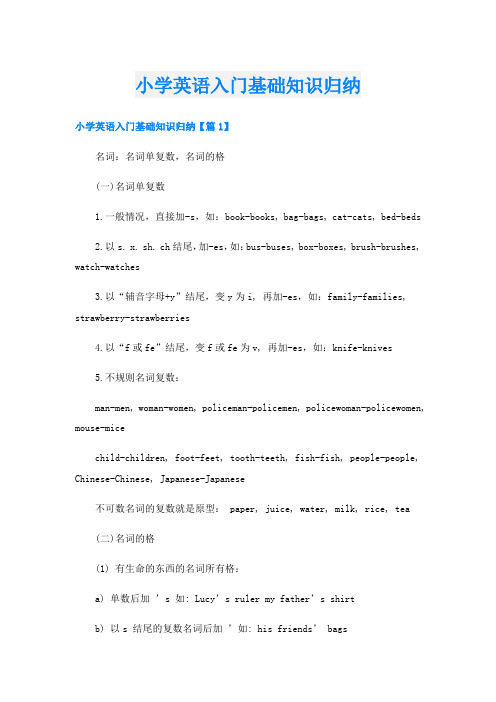
小学英语入门基础知识归纳小学英语入门基础知识归纳【篇1】名词:名词单复数,名词的格(一)名词单复数1.一般情况,直接加-s,如:book-books, bag-bags, cat-cats, bed-beds2.以s. x. sh. ch结尾,加-es,如:bus-buses, box-boxes, brush-brushes, watch-watches3.以“辅音字母+y”结尾,变y为i, 再加-es,如:family-families, strawberry-strawberries4.以“f或fe”结尾,变f或fe为v, 再加-es,如:knife-knives5.不规则名词复数:man-men, woman-women, policeman-policemen, policewoman-policewomen, mouse-micechild-children, foot-feet, tooth-teeth, fish-fish, people-people, Chinese-Chinese, Japanese-Japanese不可数名词的复数就是原型: paper, juice, water, milk, rice, tea(二)名词的格(1) 有生命的东西的名词所有格:a) 单数后加’s 如: Lucy’s ruler my father’s shirtb) 以s 结尾的复数名词后加’如: his friends’ bagsc) 不以s 结尾的复数后加’s children’s shoesl并列名词中,如果把’s加在最后一个名词后,表示共有, 如:Tom and Mike’s car 汤姆和迈克共有的小汽车l要表示所有物不是共有的,应分别在并列名词后加’sTom’s and Mike’s cars 汤姆和麦克各自的小汽车(2)表示无生命东西的名词通常用“ of +名词”来表示所有关系:如:a picture of the classroom a map of China小学英语入门基础知识归纳【篇2】情态动词的使用情态动词can(能够),must(必须),may(可以)结构:主语+can/must/may+动词原型He can make the tea.Sally can air the room.We can speak English.变否定句在情态动词后面加notHe cannot make the tea.Sally cannot air the room.We cannot speak English.特殊疑问句:(必背)What can you do?小学英语入门基础知识归纳【篇3】1、含有be动词的句子He is a teacher.The girl is very beautiful.Tim and Jack are students.变否定句在be动词后面加notHe is not a teacher.The girl is not very beautiful.Tim and Jack are not students.变疑问句在句首加does, 动词变为原型Does he like books?Does she like him?Does the dog like bones?肯定回答及否定回答:Yes, he does. / No, he doesnt.Yes, she does. / No, she doesntYes, it does. / No, it doesnt.。
- 1、下载文档前请自行甄别文档内容的完整性,平台不提供额外的编辑、内容补充、找答案等附加服务。
- 2、"仅部分预览"的文档,不可在线预览部分如存在完整性等问题,可反馈申请退款(可完整预览的文档不适用该条件!)。
- 3、如文档侵犯您的权益,请联系客服反馈,我们会尽快为您处理(人工客服工作时间:9:00-18:30)。
小学英语基础知识汇总 Coca-cola standardization office【ZZ5AB-ZZSYT-ZZ2C-ZZ682T-ZZT18】第一章名词一、名词可分为:1.专有名词和普通名词 2.可数名词和不可数名词1.专有名词和普通名词1)专有名词:是指特定的人、地方、事物、机构的专有名称。
开头的字母必须大写。
如:Tom, Martin, Shenzhen, Hong Kong, China, Sunday, October, Chinese等。
2)普通名词:是指不属于特定的人名、地名、事物、概念的名词都是普通名词。
它分为四类:个体名词、集体名词、物质名词、抽象名词。
①个体名词:用来表示单个的人或事物。
如:hospital, policeman, house, tree, cat, dog等。
②集体名词:用来表示一群人或一些事物的总称。
如:family, class, group, people, police, army等。
③物质名词:表示无法分为个体的物质。
如:water, air, tea, sugar, butter, rice 等。
④抽象名词:表示动作、状态、品质或其他抽象概念。
如:happiness, health, life, manners, love等。
2.可数名词和不可数名词1)可数名词:一般地说,个体名词和集体名词是可以计数的,所以称之为可数名词,有单数和复数形式。
如:a city---two citiesa bird---three birdsa book---ten books可数名词复数形式的构成:①规则变化:②不规则变化:英语里有一部分名词的复试形式是不规则的。
a)改变元音字母,发音也随之发生变化。
如:man---menwoman---womenpolicewoman---policewomenpostman---postmenpoliceman---policemenfoot---feettooth---teethgoose---geese注意:man和woman用作定语时,也有单复数变化。
如:a man teacher---two men teachers a womannurse---three women nursesb)有些名词单数和复数相同。
如:a sheep---two sheepa fish---three fisha deer---two deeran aircraft---four aircraftc)有些名词通常以复数形式出现,如:scissors(剪刀) trousers(裤子) clothes(衣服) glasses(眼镜) shorts(短裤)d)表示“某国人”的名词单数和复数形式因习惯不同而有不同的形式。
这类词通常分为三类。
·单数和复数相同:如:a Japanese---two Japanesea Chinese---two Chinese·词尾加s:如:a German---two Germansan American---two Americans·变man为men:如:an Englishman---two Englishmenan Frenchwoman---two Frenchwomene)其他形式。
如:a child---two childrenan ox---three oxena mouse---four mice2)不可数名词:物质名词和抽象名词一般是不可数的,所以称之为不可数名词。
如:water, milk, oil,soil, ink, bread, juice等。
它们通常只有单数形式。
但是在具体的情况下也可以用作可数名词。
如:food---foods(各种食物)fruit---fruits(各种水果)tea---teas(各种茶叶)gas---gases(各种气味)如果需要表示名词的具体数量时,可用以下的短语写:a glass of juicea piece of papera slice of breada bottle of oila box of ……a bowl of ……a dish of ……a pair of ……a kind of ……a kilo of ……a kilogram of ……a basket of ……a bag of ……a full of ……a basin of ……a cup of ……a packet of ……a lot of ……而有些物质名词和抽象名词的单复数含义不同,如:people(人民/人们) peoples(民族)water(水) waters(海/潮水)paper(纸) papers(报纸/试卷/文件)custom(习惯) customs(海关)time(时间) times(次数/倍/时代)brain(头脑) brains(脑力/智力)arm(胳膊) arms(武器)snow (雪snows(积雪)cloth(布) clothes(衣服)第二章冠词冠词分为:1.定冠词(the)2.不定冠词(a, an)一、定冠词(the)的用法:1.特指某(些)人或某(些)事物;(冠词的基本用法)2.用在由普通名词构成的专有名词前;3.用在某些形容词前,表示某一类人;4.用在姓氏复数形式前,表示“全家人”或“夫妇俩”。
5.用来表示前面已提到过的人和事;6.指双方都知道的人和事;7.世界上独一无二的事物;8.用在江河、湖海等专有名词前;9.用在序数词和最高级的前面;10.用在乐器前面(球类前不加);11.在单数的可数名词前;I have a book.The book is interesting.I see a boy. The boy is Tony.I like playing the piano.12.用在某些固定的词组中。
如:in the tree, on the tree, in the morning ,in the afternoon, in the evening, in the hat, look the same, go to the cinema, go to the zoo, go to the classroom二、不定冠词(a和an)的用法:不定冠词:不定冠词表示“一个或一”。
不定冠词a用于辅音音素开头的单数可数名词前,an用于以元音音素开头的单词可数名词前。
泛指某一类人或事物。
表示数量有“一”的意思,但语气没有one强烈。
如:a book, a pen, a boy, a girl, a worker, an arm, an apple, an orange, an hour, an egg以字母U开头的单词,U的发音为/ju:/时,前面要用冠词a,发元音为音音素的单词,前面要用冠词an。
如:a useful book(一本有用的书),a university(一所大学),an umbrella, an hour, an ugly boy, an honest child, an interesting story三、不用冠词的地方:1.抽象名词、物质名词和单个构成的专有名词(国名、任命等)前一般不用冠词。
如:Chocolate is made of cocoa.2.表示月份、星期、季节的名词前通常不用冠词。
如:Sunday is the first day of a week.3.可数名词的复数形式或不可数名词表示一般意义,而不特指具体的人或事物时,不与冠词连用。
如:Women are usually more careful than men. Beef is more expensive than pork. Horses run much faster than sheep.4.名词前已有this, that, these those, my, your, whose, some, any, no, each, every等代词时,不用冠词。
如:My school is far from here.Whose are these clothes What will you do this week5.表示球类、棋类、三餐、学科、语言的名词前不用冠词。
如:Football is a very popular sport in the world. I like playing chess. He is good at Chinese and English.6.在表示节日的名词前通常不用冠词。
如:The Children’s Day in on June the first. Chinese New Year is coming soon.注:表示传统节日的名词前需要加冠词。
如:The Spring Festival is the most important festival in China.7.某些短语中不用冠词。
如:on foot, by plane, by train, at night, at noon.8.在有些名词前加定冠词和不定冠词的意思不同。
如:in the class(在班上) in the bed(在床里) in class(在课堂上) in bed(卧床) There is no school tomorrow.(明天我们不上学)第三章代词英语中的代词可分为:人称代词、物主代词、反身代词、指示代词、疑问代词等。
一、人称代词:人称代词是指表示“你、我、他、她、它你们、我们、他们、它们”的代词。
人称代词还有单数和复数之分,见下表:人称代词的主格做主语,人称代词的宾格作宾语。
如:He works in the factory.I work on the farm. He likes her. We love them.二、二、物主代词物主代词是表示“你的,我的,他的,她的,它的,你们的,我们的,他们的,它们的”的代词。
物主代词分为:形容词性物主代词和名词性物主代词。
见下表:三、反身代词:反身代词是指表示“我自己,你自己,他/她/它自己,我们自己,你们自己,他们/她们/它们自己”等的代词。
见下表:四、指示代词:指示代词是指表示“这个this,那个that,这些these,那些those”的代词。
见下表:除此之外,在小学阶段出现的指示代词还有so, same, it,等。
的用法:打电话时,常用that询问对方是谁,用this介绍自己是谁。
It的用法比较多。
1)说话人不知道对方是谁可以说:Who’s that It’s Li.2)指时间:What’s the time It is five.3)指天气:What’s the weather like It is cold.4)指前面提到的事情:What’s is this It is a book.的用法:same的意思是“一样的,相同的”常与the连用。
